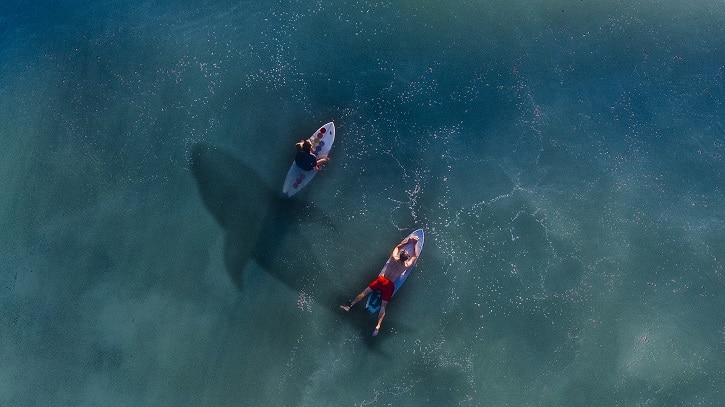Extreme sports have a broad audience attached to them, despite the mass populous feeling the opposite of anything being deemed as extreme.
No matter the niche of a sport, there’s always a group of determined individuals who are willing to dive deep into the sport.
With this in mind, surfing is an immaculate sport that many people are obsessed with for its intense and grueling balance and physique requirements.
Unlike most other sports, surfers have to deal with one other potential obstacle, sharks.
Sharks can be quite frightening for countless reasons, which begs the question, are surfers scared of sharks?
To answer this question…no, most surfers aren’t scared of sharks. Of course, if they come in close contact with a shark, their fears may undoubtedly rise, but generally speaking, surfers aren’t afraid of sharks. Surfers have a strong connection with the ocean and surfing, meaning they understand the danger associated with sharks and how to avoid them.
Like anything else, the more prepared and understanding someone is with something, the less likely they’ll be to have an issue with it.
No matter the specifics of the matter, surfers aren’t expected to have close encounters with sharks.
Of course, this isn’t always the case; surfers understand when to surf and when danger might present itself.
Considering they know this, they usually know what to do if a shark is spotted.
Nevertheless, it’s fascinating to see how something like sharks is typically scary for most people, might not be for surfers who are in technical close-contact with them all the time.
Down below, we’re going to discuss everything there is to know about the scariness of sharks and surfing.
We’ll discuss why some surfers might be scared, why some aren’t, the danger involved, and much more.
Let’s get started!
Why are some surfers scared of sharks?

Although most surfers aren’t scared of sharks, there a few instances when a surfer might be scared of a shark.
Keep in mind, this depends on each surfer, but it does happen and is worth noting when the case presents itself.
First off, a surfer can be scared of a shark if they’re a beginner or a generally uneducated about sharks and the ocean.
Shark attacks or incidents typically happen to novice surfers or people who aren’t fully aware of the situation.
As dreadful as an encounter with a shark might be, they can be avoided if the people involved know what to do and how to handle it.
It’s never a good idea for someone to come in contact with a shark, overreact, and run the chance of getting injured.
On the other hand, if a surfer had a bad experience with a shark, this can prompt them to have PTSD from the incident, which can worsen when they see a shark.
Even if they’re not in the water, someone who had a bad experience with a shark might get nervous or scared whenever they’re on a beach or near water.
Lastly, if a person tries to be too brave and get close to a shark, an accident can occur, which can prompt them to be scared.
This is why no one should try to be cocky or over-confident when you’re in the water with sharks; you never know what might happen.
Why are some surfers not scared of sharks?

From the opposite end of the spectrum, which tends to be more familiar with surfers, you have surfers who aren’t scared of sharks.
Statistically speaking, surfers aren’t scared of sharks for a few key reasons, many of which people aren’t aware of.
First and foremost, surfers who are knowledgeable about sharks know they don’t try to attack humans purposely.
In fact, it’s incredibly rare for a shark attack to occur in the first place, making it very unlikely for a surfer to come in contact with a shark to begin with.
On the other hand, most surfers are ocean conservatives and want the ocean sea life’s longevity and health to be known.
Since sharks play a vital role in the ocean, surfers understand the importance of raising awareness about them, meaning they’re typically not scared of them.
The other primary point is surfers who know where to surf and what spots are dangerous with sharks. For starters, a group of surfers is less likely to prompt a shark attack than an individual since sharks can be scared off very easily.
Basically, as long as surfers are educated and know what to do in every potential shark situation, the fear becomes far less likely.
Whatever the case might be, it’s fascinating to see how sharks’ fear isn’t too common for surfers.
How are sharks dangerous and scary to surfers?
Sharks are most dangerous when they run out of food and are spotted near a beach.
Whenever their spotted or word gets out that their food supply is low, this is when it’s most dangerous for surfers to go out.
However, like many other extreme sports, some surfers might prefer to surf in these conditions for the pure thrill of being near sharks.
Obviously, this should never be done and can prompt some severe fear if something goes wrong.
When it comes to surfing and being near sharks, whenever someone isn’t too experience in the matter, this is when their fears increase.
Of course, this varies from individual to individual, but they’re always scared whenever someone does something new.
On the other hand, if a surfer was ignorant of sharks and sees one for the first time, this is when fear can settle in for the first time.
Fear is a danger itself since it can cause someone to do something dumb, making matters worse.
How should surfers stay safe and not be scared of sharks?
Surfers who want to stay safe and not be scared of sharks should be mindful of a few key points.
Generally speaking, these points aren’t too difficult to comprehend, and once known, people can comfortably surf for fun.
First off, surfers should get in as much knowledge as they possibly can.
If they can fully understand where sharks are located, why they’re there, know what to do if they see one, and other information related to the subject, this will help eliminate fear.
Once fear is eliminated to the point that someone isn’t overconfident, this will help them stay safe and push forward in the right direction. Surfers should also know their limits and when potential danger might present itself.
If a report comes out about lousy weather, sharks being spotted, and so on, it’s probably in their interest not to go out surfing.
A surfer might never know when danger will present itself, which is why it’s better to be safe than sorry.
Are some sharks scarier than others?
Believe it or not, there are countless different sharks species, meaning some are far less of a threat to humans than others.
Although some sharks might appear physically scarier than others, some are far less of a threat than you might realize.
Nevertheless, it’s important to note which sharks are less of a threat than others to help you with your fears.
Whatever the case might be, remember to be mindful of what you should in each situation.
Even if you contact a harmless shark, make sure you stay away and be safe as best you can.
Harmless sharks to humans:
Whale sharks
Nurse sharks
Basking sharks
Leopard sharks
Angel sharks
Bamboo sharks
Goblin sharks
Greenland sharks
Dangerous sharks to humans:
Bull shark
Tiger shark
Oceanic whitetip shark
Longfin mako shark
Great white shark
Keep in mind; this list isn’t every dangerous or nondangerous shark; it’s just a standard list of sharks to be mindful of.
Whatever the case might be, make sure you treat every situation somewhat similar for your safety.
You never know what might happen.
What should a surfer do if they see a shark?
Generally speaking, whenever a surfer sees a shark, no matter what kind of shark it might be, make sure you immediately get out of the water.
Don’t panic and draw attention to yourself, but always try your best to get out of the water as safely and calmly as you can.
Since sharks can’t go on the beach to attack you, this should be very straightforward and easy for you to avoid potential danger.
Sharks can only attack and cause harm if you’re in their environment, and the land is undoubtedly a safety area.
However, most shark attacks typically happen very sneakily and out of nowhere.
Meaning, chances are if you actually see one, you’re most likely safe, but should head to land anyways.
Sharks are usually only scary when they surprise you since this means they want some food.
The world of surfing will continue to grow in popularity, no matter the scarcity of sharks that might present themselves from time to time.
As long as surfers keep their fears at bay and know what to do in these potential situations, they’ll be fine and can continue to enjoy surfing.







